Slavic SFF is a fascinating corner of our beloved genre. Often times it gets unfairly overlooked, or lumped in with Western European SFF and dismissed as just another faux medieval fantasy vaguely inspired by (Western) historical events.
But the reality is a completely different matter.
Eastern European genre fiction doesn’t just differ substantially from that of American or Western European pickings on a cultural level. Its simultaneously ancient and painfully recent history regarding the USSR, socialism, the Russian revolution, space pioneering—as well as Slavic folklore that builds more upon myth and pagan legend than the Christian side of scale—provides a ripe playing field to explore unique themes and cultural concerns. The juxtaposition of harsh suppression and censorship with liberal freedom of expression in science fiction and fantasy also provides an interesting case study for the power of the pen.
The Turkic, Chechen, and Mongolian influences seen in foods, architecture, and language stir up a melting pot that builds up Slavic history today and equips Eastern European authors with the tools to build a distinctive world.
So. There’s some truly fantastic novels out there that cement Slavic SFF’s contribution to cultural diversity. Here are the five you should have on your shelf right now.
Metro: 2033 — Dmitry Glukhovsky
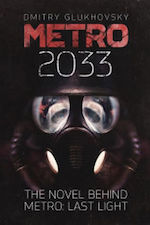 Thanks to the video game adaptation, chances are you’ve heard about this one already. The novel sees our hero Artyom in a post-apocalyptic Russia where survivors camp out along the skeleton of the real life Moscow Metro where factions and bandits fight for control over the linerails. But the presence of mysterious creatures known as Dark Ones kicks chaos into motion.
Thanks to the video game adaptation, chances are you’ve heard about this one already. The novel sees our hero Artyom in a post-apocalyptic Russia where survivors camp out along the skeleton of the real life Moscow Metro where factions and bandits fight for control over the linerails. But the presence of mysterious creatures known as Dark Ones kicks chaos into motion.
The easy blend of magic realism and social SF, mashed together with the threat of communism and fascism, set this post-apocalyptic adventure from its Western counterparts to provide a thrilling, grimdark adventure to cut your teeth on.
Blood of Elves — Andrzej Sapkowski
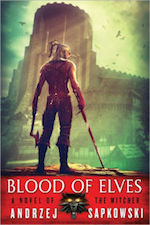 It’s impossible not to include this one. Another title that’s made its way to the video game format: Blood of Elves is the first novel in the Polish Witcher Saga. There are two previous short story collections worth checking out, but this is the best entry point.
It’s impossible not to include this one. Another title that’s made its way to the video game format: Blood of Elves is the first novel in the Polish Witcher Saga. There are two previous short story collections worth checking out, but this is the best entry point.
In the centre of a vicious civil war is Ciri, a young girl with unusual magic powers that leave the most skilled of sorceresses baffled. With monarchs hungering for her blood, it’s up to the gruff-faced Geralt of Rivia to protect her and turn the tide of a nation. The journey is packed with multiple fantasy races and how they came to be, rich world-building, deep-rooted tension and velvety character drama invoking an undeniable sense of verisimilitude. Taking inspiration from Polish folklore and history, Blood of Elves is a gripping gateway to a velvet-rich world of strange magic, archaic prophesies and best of all: wickedly cool monsters.
The Stranger: The Labyrinths of Echo, Part One — Max Frei/Svetlana Martynchik
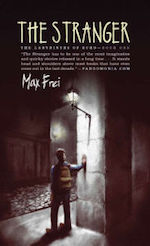 Sliding away from the epic and into the weird and urban, Ukrainian-born author Max Frei’s The Stranger gives us … well, Max Frei: a loner who sleeps all day but is deprived of the ability to do the same at night. In his dreams he slips into a parallel universe where he’s an agent in charge of cases that start weird and only get weirder from there.
Sliding away from the epic and into the weird and urban, Ukrainian-born author Max Frei’s The Stranger gives us … well, Max Frei: a loner who sleeps all day but is deprived of the ability to do the same at night. In his dreams he slips into a parallel universe where he’s an agent in charge of cases that start weird and only get weirder from there.
Snarky, unapologetically voice-driven and accompanied by a very bleak and very Slavic twisted sense of humour, The Stranger is one of those novels that you’ve read half a dozen times before but do so again because it’s just that good. If you’re a fan of The Dresden Files then this one is for you. The teenagey-ness of our protagonist and his voice could be off-putting to some, but its well worth the effort for those with a rebellious streak.
Night Watch — Sergei Lukyanenko
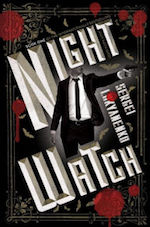 If you’re looking for something unapologetically Eastern European, then you’re sure as hell going to find it here. The first in this epic saga captures the conflict between the two variations of the supernaturally-gifted Others, the Dark (agents of the night) and the Light (agents of the day). We follow Night Watcher Anton Gorodetsky as peace comes crashing down and the inevitable end o’ the world looms overhead.
If you’re looking for something unapologetically Eastern European, then you’re sure as hell going to find it here. The first in this epic saga captures the conflict between the two variations of the supernaturally-gifted Others, the Dark (agents of the night) and the Light (agents of the day). We follow Night Watcher Anton Gorodetsky as peace comes crashing down and the inevitable end o’ the world looms overhead.
Putting aside the silk-smooth action and thriller pace, there’s an unapologetic Russian flavour to Lukyanenko’s world that slides off the pages—the distinct post-Soviet vibe, the clash of Western capitalism against socialism, morally grey philosophy, unrelenting urban nihilism, and of course: vodka. Lots and lots and lots of vodka. Night Watch wears its Slavic badge loud and proud and doesn’t let you forget it for a moment. It’s the popular opposite of a Western European urban fantasy and it’s absolutely glorious. If you can stomach its dense offerings, pick it up post-haste.
S.N.U.F.F. — Victor Pelevin
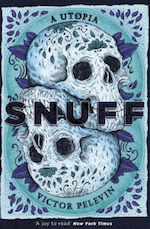 Here’s a little weird, transgressive punter of a novel to wrap up our list. Pelevin’s S.N.U.F.F. sweeps us into a flying city called Byzantium (or Big Byz), full of Russian-speaking inhabitants, whereas far below lies the collapsed world of Urkaina—slang for criminal in Russian. We follow Damilola Karpov as he fights his battles equipped with a video camera and his remote-controlled drone to essentially demonize the oppressed Urkaina below.
Here’s a little weird, transgressive punter of a novel to wrap up our list. Pelevin’s S.N.U.F.F. sweeps us into a flying city called Byzantium (or Big Byz), full of Russian-speaking inhabitants, whereas far below lies the collapsed world of Urkaina—slang for criminal in Russian. We follow Damilola Karpov as he fights his battles equipped with a video camera and his remote-controlled drone to essentially demonize the oppressed Urkaina below.
It’s an impenitent political satire of modern-day Russia and its very complex relationship with Ukraine (the name of this technologically inferior and “barbaric” world under Big Byz is not accidental), and we’re treated to a very dark and pull-no-punches discourse that makes A Clockwork Orange look like child’s play. Religion, media corruption, immigration, and Western brainwashing are all unpacked with nuanced political wordplay and neologisms that press us deeper into this savage little totalitarian nightmare. It’s definitely the quirkiest title on this list but the mental workout is well worth the effort.
Born in 1995 with a twisted sense of humour and taste for craft beer, Jeremy Szal’s work has appeared in Nature, Nature: Physics, Abyss & Apex, Lightspeed, Strange Horizons, Tor.com, The Drabblecast and others. His work has been adapted into audio and translated into Arabic, Polish and Chinese. He is the fiction editor for Hugo-winning podcast StarShipSofa where he’s worked with authors such as George R. R. Martin, William Gibson, Kim Stanley Robinson, Joe R. Lansdale and others. He’s also got a rather useless BA in Film Studies and Creative Writing. He’s completed multiple novels and is on the hunt for literary representation. He carves out a living in Sydney, Australia. Find him on Twitter at @jeremyszal.










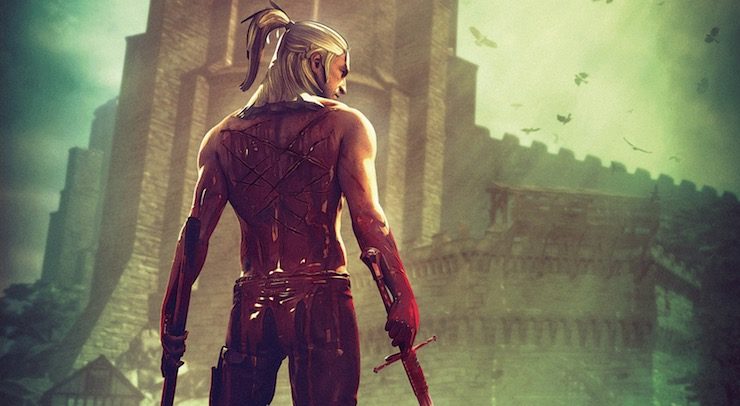
Thanks for this!! Always appreciate some good recommendations for non-American/British books. Just added a few of these to my alarmingly large amazon wish list.
The only problem with this list is that you are limiting yourself to stuff with English translations.
My wife (a native Pole) is a big fan of Dukaj, particular his novel Ice.
Also, no Lem?
Walker: I read Dukaj’s THE OLD AXOLOTL in English translation last year and it was fabulous.
Thank you for this list. I have the whole Night Watch series (I didn’t know if you knew it was a series). The movies made from the books are fascinating as well. We preferred the subtitled versions.
Also, I would recommend Roadside Picnic, by Arkady Strugatsky and Boris Strugatsky, written in 1971. Aliens made a trip to Earth, leaving behind their trash. Their picnic site was made into the Zone, and was off-limits to everybody but scientists. Of course, enterprising black-marketeers made their living guiding people in and out of the Zone, as well as smuggling artifacts out. It’s dark throughout, very fatalistically Russian in tone, and I recommend it.
@5: Roadside Picnic is a great novel. I also recommend the Strugatsky’s Hard to be a God and Monday Starts on Saturday.
I read it some time ago, but The Scar by Marina Dyachenko and Sergey Dyachenko, is worth a read. I’d ended up with the book by accident after my local library sent it to me instead of the Mieville book, and found myself pleasantly surprised.
Also, I really rather liked The Sacred Book of the Werewolf by Victor Pelevin. Strange, surreal, and very much rooted in a Slavic sense of humour.
They weren’t great literature by any stretch of the imagination, but I was entertained by Alexey Pehov’s Chronicles of Siala (Shadow Prowler, etc.).
@2: Yeah, that was a big setback when I was writing this. My father, also a native Pole, had read a couple of novels only in Polish (and a few in Russian) like Ice, but I don’t speak the language so I couldn’t put it on this list (and non-Polish speakers wouldn’t have been able to read it anyway).
The better translated novels sell, the more willing publishers will be to spend the time and money to bring us English-speakers new ones.
I’ve only read Metro 2033 so far, and I don’t know wheter to praise it or bin it.
The world he’s made is severely intriguing, and parts of both background and current story is fantastic. The monsters… they’re a bit crap in the game, way too monstrified, just generic ‘oh, it’s a muscular blob with too many teeth’. In the book they are really scary, and they mostly make sense.
Other parts of the story, and the ending in particular, are utterly craptacular. Dead ends, branches and arcs that lead nowhere.
Still, I’m really caught by the overall story and world.
Oooh. *gets Blood of Elves from a library*
Disagree about Blood of Elves being the best starting point – the Last Wish (the first short story collection with a loose connecting framework) serves as an excellent introduction to Geralt, the supporting cast, and the world in bite size chunks.
Blood of Elves throws you into the story about Ciri and doesn’t give you the same grounding in who these people are and what the hell is going on.
Thank you so much for this! I grew up on Russian fantasy and sci fi– my grandma, a journalist that worked all over the Soviet Union used to buy and read the Strugatsky brothers, Pelevin, etc. Russian SFFH has always been this slippery pocket of honesty in the middle of very charged times, and so many Soviet block authors have produced worlds that are so so so different from Western fantasy. I just wish our sense of humor translated better ;)
I get the feeling that as much as English authors get published worldwide, SFF books from non-English-speaking countries don’t get the publicity they often deserve. I say that regarding not only slavic SFF, but also other regions. I personally love discovering different approaches to the genre – but yes, language often poses an obstacle.
However, at the beginning of Novemeber I went to Barcelona for Eurocon – and I was impressed by the variety of initiatives people from all over the Europe presented. There was also published a special issue of Polish “Smokopolitan” fanzin – it’s got translated some short stories from contemporary Polish authors and articles regarding Polish speculative fiction stage. So, if anyone is interested, you can check it out, since it is available to download for free: http://krakowskiesmoki.historiavita.pl/smokopolitan/eurosmoko/?fbrefresh=true
@12 TSPSweeney: I agree. Blood of Elves is certainly not the beginning; and actually, some of the short stories are the best parts of the whole saga.
Also, Yay for this mentioning of Sapkowski´s masterpiece; I even cannot put in words, how much I love his books. I think that the Witcher is probably the reason I don´t like ASOIAF that much; it is kind of similar, sort of, and Witcher is easily better. My second favourite saga, right after WOT. :)
I’ve read both Last Wish and Blood of Elves…simply stunning. For me, it was extremely enlightening to read a work of fantasy that was so…different from the normal Western fantasy I’m used to. I don’t know quite what it was, but the world and characters felt much more real and grounded than in most fantasy works I’ve read and there was such a simple beauty about the way Sapkowski wrote. Is there any other Sapkowski that you’d recommend, Tessuna or others?? Thanks =)
I absolutely agree with TSPSweeney @@@@@ 12 and Tessuna @@@@@ 15 that one should start with Sapkowski’s The Last Wish, not Blood of Elves.
Thanks for this, Jeremy! I’ve been looking to add something now (and non-western) to my tbr.
@16 Sonofthunder: Well, the Witcher saga actually consists of seven books, so if you´ve read only those two, there are still five left: Sword of Destiny (another short stories) and continuation of Blood of Elves, that is: Time of Contempt, Baptism of Fire, The Tower of Swallows and Lady of the Lake.
Of the non-Witcher stuff I love especially the short story Maladie.
Then there´s The Hussite Trilogy, set in Bohemia, 15th century, but still a fantasy. It is not as awesome as the Witcher, but still pretty awesome.
The rest (Viper, Storm season, some short stories) I didn´t like that much.
Thanks. *acquires The Last Wish*
Wait. One of my libraries says Blood of Elves is Book 3 in the Witcher series. Another library says Baptism of Fire is Book 3. What gives? I’m confuzzled.
@20 AeronaGreenjoy: Yes, it is pretty confuzzling. Originally, there were some short stories followed by pentalogy (Blood of Elves being book 1). Then somebody realized that the short stories are actually important for understanding the whole thing, so nowadays it is usually 2 short story books (Last Wish, Sword of Destiny) followed by the pentalogy (Blood of Elves being book 3).
And when I read Baptism of Fire, I think it was listed as #4 in the Witcher series …
It’s all a matter of perspective and/or numbering. Baptism of Fire is the third novel but the fifth book (at the moment, at least). The series started with two short story collections:
Last Wish (earliest stories per internal chronology)
Sword of Destiny (which wasn’t actually translated & published in English until last year, although I think its Polish publication might predate Last Wish)
And then continues with five novels:
Blood of Elves
Time of Contempt
Baptism of Fire
Tower of the Swallow
Lady of the Lake (not published in English yet, but due out next year)
The five novels tell a pretty continuous story — I don’t think Baptism of Fire would make a lot of sense if you hadn’t already read Blood of Elves & Time of Contempt.
There’s also apparently an even newer collection of short stories that takes place sometime around the events of The Last Wish, but I don’t know when it’ll be released in English. (The earlier books in the series were all released in Polish back in the 1990s, and the new book just came out in Polish a couple of years ago.)
I will have to check these out, thanks! I think the only Slavic SFF I’ve read is Dictionary of the Khazars, which I enjoyed (and which I recommend).
@22 hoopmanjh: There´s Storm Season, not a short stories collection, but a novel that takes place somewhere around The Last Wish. It is not as good as the rest.
@Tessuna — Ah! That’s the one I was thinking of. Hard to get the details when the only Goodreads listings are in Polish … Thanks!
Seriously? No Stanislaw Lem? Solaris? Fiasco? He’s well before the 90’s, but worth looking up.
@7 Agreed! They make very immersive worlds. The Scar is one of my favorites as well. I think Elinor Huntington did good with translation.
@8 I feel like “Wind and Sparks” is a stronger series of Pehov. Unfortunately it is not translated yet, as far as I know.
the Alterworld series by D. Rus was excellent and i believe they are all translated now.
https://smile.amazon.com/AlterWorld-LitRPG-Play-Live-Book-ebook/dp/B00LYJOII6?sa-no-redirect=1
Tessuna, thanks for the information on the rest of the Witcher saga books!! *adds to list* Now I have even more books I need to buy!!! Much appreciated.
@12: I had to put Blood of Elves on here as the first *novel*, since the others are just short fiction collections. I jumped in with BoE easily enough, but I’d played the games first so I could be missing something.
@13: Not at all! My grandma is also Russian and my dad’s Polish, so writing this up was very personal and a great experience. And I did it partially for reasons you list: it’s so wildly different from Western European and American work, so I always get disappointed when I see readers saying they’re sick and fed up with whitebread “European” SF/F…when they haven’t touched half of it. So very glad to bring these books to new readers.
@14: I absolutely agree – it’s a major problem. I think that in our pursuit of diversity its a gaping blind spot that we all have. Getting published and into readers hands is very difficult, and that’s if you’re in America. Getting the same readership if you’re in Russia or Greece or Cuba is ten times the challenge, and we’ll never truly be diverse if we’re only reading books from the Anglo world. There’s still so many fantastic, untranslated novels out there, but the language barrier blocks us from getting to it. So the more lists like these, the better. :)
@29 Sonofthunder: You´re welcome!
@22 hoopmanjh: Coincidentally, just a few minutes after writing that last comment, I had an edition of Witcher short stories in my hands – I´m a librarian, – and it was all of the short stories in one, not two books. That would explain Baptism of Fire being book 4.
I opened it on ending of “Something more”, read a few sentences and started to cry. That´s what this ending does to me every single time, but it is not cool when it happens at work.
Cannot believe you don´t have the last book of the series yet. I´ve read it some 13 years ago. And still remember how it felt.
You know what would be awesome? A Witcher re-read. I know, very improbable. But it would be awesome.
This is a great list, and it’s wonderful to see Slavic sci-fi and fantasy given some attention and promotion. But please please add the translators’ names. The books didn’t translate themselves. Many of the comments here regret the fact that eg Ice by Jacek Dukaj isn’t in English yet – well, none of these books would be without the translators. So it would be great if bloggers who do the excellent work of promoting translated literature also credited those unsung heroes, the translators.
@Tessuna — Yeah, I still haven’t read Tower of the Swallow yet, so at this point I might wait for the English publication of Lady, then go back and reread the entire series.
And, of course, if we’re talking fantasy, historic fantasy shouldn’t be exempt. There’s old novels like Vladimir Bartol’s Alamut and Henryk Sienkiewicz With Fire and Sword, not to forget Yevgeny Ivanovich Zamyatin’s We – one of the first works banned in the USSR. Also, for a more surreal take, dive into Mikhail Bulgakov’s The Master and Margarita.
Thanks. I don’t have access to Sword of Destiny, so I hope going from The Last Wish to Blood of Elves will work.
A large percentage of the fiction I’ve first-read this year had come to my attention via Tor.com. :-)
Given that Sword of Destiny didn’t get an English-language release until 7-8 years (plus or minus) after Last Wish and Blood of Elves, I think you should be fine … :)
Is it just me, or is there a lot of “unapologetic” in this review? Just because these authors don’t build their work on the same cultural basis as Western sci-fi doesn’t automatically make them subversive and edgy. It’s just a different framework of references and it’s good to see translated works not being made easy for the Western readership to relate to. There’s no apologising because there doesn’t need to be any.
Also, I do second the recommendation for Strugatsky brothers Hard to be a God.
Uprooted by Naomi Novik was one of my favorite reads last years and I think its worthy of mention.
Not sure if Novik counts, since she’s an American of Eastern European ancestry, but Uprooted is set in an alternate fantasy Poland, and it is awesome.
Super! One of these titles will be on my wish list.
I’ve now read The Last Wish and Blood of Elves, and found them somewhat interesting. But I didn’t find the plot and setting much different from plenty of the Western fantasy I’ve read. Some of the creatures, witchers…what else is there that I’m missing? I feel like a dolt admitting this, and one badly out of touch with my own part-Polish ancestry.
It is very strange you don’t mention any of Lem’s works, one of the greatest Polish writers of all times.
AeronaGreenjoy @@@@@ 41
It is not surprising you found it not too different from Western fantasy. The fact is that Poland in 14-15th centuries (broadly the tech level of the books/games) was part of Western European culture. Of course it had its own unique characteristics but part it was nonetheless. Armour-plated knights, crossbow and halberd armed infantry, lords, peasants… Even the heavy troops of the Lithuanians looked very Western! Castles and towns were build and fortified by builders with Germanic influences (who in turn had French, Italian, etc influences). The folklore is relatively more obviously Slavic.
Wow, a lot of comments since I was here last! Gonna pick through ’em…
@38/@39: Yeah, I wouldn’t count Novik as a Slavic writer in terms of nationality since she’s primary American, but Uprooted is absolutely a Polish-inspired fantasy…just not a Slavic fantasy and not from a Slavic writer, if that makes sense? If she’d been born/was living in Eastern Europe and surrounded by the culture I think it’d be a different matter. Same as that setting a novel in Africa doesn’t necessarily make it an African novel, but that’s a conversation for another time. ;)
@41: Wow! That was…a fast read. But as 43 says, the 14th-15th century Poland was more on the level of Western Europe for the most part, whereas the folklore, food and language was not. Even today, if you go into old taverns in Poland they’re done up in a very Slavic style that are mimicked in both the books and video games. There’s also of course the monsters like leshen and vodyanoi and which are Slavic creatures. Good observation, though.
@44: Audiobooks on my smartphone can make for fast ‘reading.’ :-)